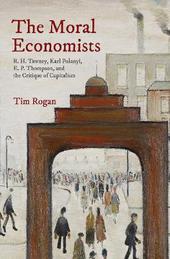
|
The Moral Economists: R. H. Tawney, Karl Polanyi, E. P. Thompson, and the Critique of Capitalism
Hardback
Main Details
Description
A fresh look at how three important twentieth-century British thinkers viewed capitalism through a moral rather than material lens What's wrong with capitalism? Answers to that question today focus on material inequality. Led by economists and conducted in utilitarian terms, the critique of capitalism in the twenty-first century is primarily conce
Author Biography
Tim Rogan is a fellow of St. Catharine's College, Cambridge, where he teaches history.
Reviews"Tim Rogan's book, The Moral Economists: R. H. Tawney, Karl Polanyi, E. P. Thompson, and the Critique of Capitalism (2017), ably reconstructs the first extensive crisis of liberalism."---Pankaj Mishra, New Yorker "The Moral Economists is part historiographical exegesis, part subtle polemic about the limitations of contemporary critiques of capitalism. . . . Rogan looks to history for help in understanding capitalism, its works and its empty promises."---Katrina Navickas, London Review of Books "A timely, vivid and attractive book, vindicating on every page Rogan's choice of three musketeers, handing on their flame to their noble heirs."---Fred Inglis, Times Higher Education "Rogan's captivating work of intellectual history demonstrates that utilitarianism shaped much of the Left, as well as the Right's thinking on social questions."---Patrick Diamond, Times Literary Supplement "Rogan's reintroduction of Tawney, Polanyi, and Thompson to modern readers is a valuable endeavor."---Joseph Coletti, Journal of Markets & Morality "Rogan brings the authors and their perspectives closer to the reader not only by presenting their opus and their thoughts but also by contextualizing them . . . thoroughly and deeply researched."---Christian Leitner, Zeitschrift fuer Soziologie "Tim Rogan's book is a fine example of intellectual history and will appeal to historically inclined humanists and social scientists at large, as well as to political activists, career politicians, and interested readers of all stripes, who, for one reason or another, may wish to ruminate on twentieth-century British experiences in civilising capitalism."---Giorgio Baruchello, European Legacy
|